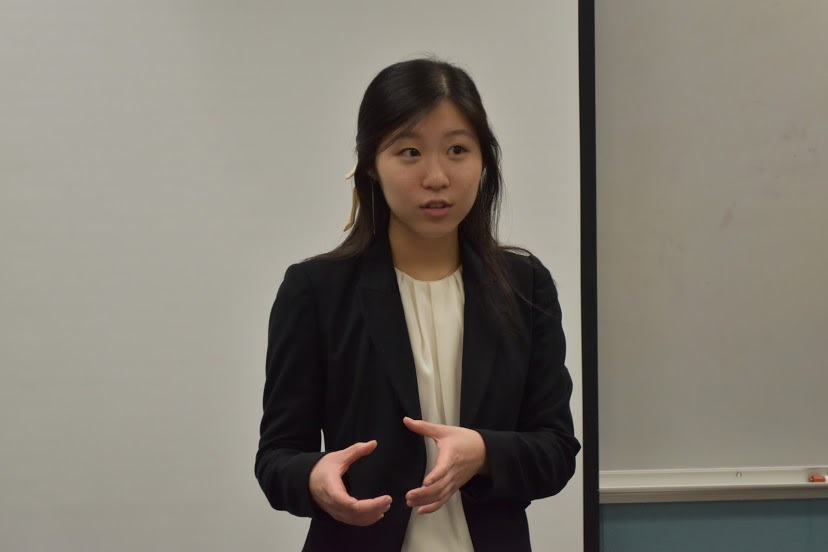Peering Behind the Mask of Success
Grace Lee, a Neuqua Valley student, leading a Senior Class Student Council meeting.
January 28, 2020
Success [suhk-ses] :
the attainment of wealth, position, honors, or the like.
Success is based upon a number of things: x, y, and z. These include good grades, likability, leadership skills and so on. It is arguable that success has increasingly gotten more difficult to pinpoint over time. Every day, people create and seek out new ways to get involved for that adequate application booster. With all the new opportunities, it has become more difficult to be a well-rounded student in every single way that much of the media portrays the “perfect student” to be. As expectations for students continue to grow, so does the pressure to be something that one may not want to be. The definition of success is constantly changing, but for students here at Neuqua, many of them are ready to rise to the challenge. According to Julie Bannack, the P.E. Leader advisor, success is “accomplishing a goal that you have set for yourself.” The often-overlooked impact of this reality is the back-breaking lengths these individuals put themselves through to meet that perfect image from all sides. Ranging from P.E. leaders to senior advisors, club executive board members and sports team captains, there are many ways for students to prove their unique leadership abilities. At Neuqua, there are a number of students who manage to hit every one of these on the dot– and impress everyone else along the way. They are the “liked,” the “loved,” the “respected”; these are the people everyone wonders about. How do they function when their world is constantly spinning upside down? How do they keep walking forward when their path is so filled with obstacles and distractions? The mystery behind changing student success is one that must be explored and prodded for what it really means to students and adults alike.
For those of you who may not know Grace Lee, she is a senior here at Neuqua. Lee is a senior advisor, part of the Model UN Executive Board, a category leader for speech and the Student Council Senior Class President. With these roles under her belt, Lee fits the description of a “successful student.” She described her original shyness coming into high school and how joining speech was the “catalyst” that helped break her out of her shell. Although many of these extracurriculars seem to be great application boosters, and they are, this long list of activities only hides how much work she must put in to keep up with high standards. Lee says, “part of the process is to act the part,” which displays the sheer measure of thought she has put into maintaining this image of success. Though she finds balancing these activities to be difficult, the best way she manages these things is prioritization. She mentally creates a list of her tasks, then orders them in how much urgency each part carries. This is how she is able to complete everything she needs to without falling behind on her work. With mostly AP/ Honors classes on her schedule, Lee finds the extracurricular load to be a weight added to her already heavy shoulders.
Other students who have a harder time balancing their many activities can often crack under the pressure. These high expectations for success have majorly impacted how students respond to challenges. For example, the problem of cheating has gone from an issue swept under the rug, to part of the vocabulary every stereotypical AP student understands. Amanda Kontos, a senior advisory teacher explains, “…expectations for success have negatively impacted students at NVHS because it put [sic] a lot of pressure on them to be the best and compete… We have seen an increase in cheating at NVHS and I believe this could be linked to the pressure students feel to succeed.” Coming from the individual who chooses some of the most successful students for the advisory program, Kontos’ opinion carries weight within this situation. Seeing as that the characteristic model of the successful student does not include cheating, many of the current methods behind success are changing from the traditional definition. It is part of the noticeable difference in being successful for one’s self, versus solely wanting the presentation of it.
Understandably, there are many students at this hyper-competitive school who fight to meet these high standards constantly. With college applications, standardized exams, out-of-school commitments and many other engagements on the rise, it is extremely difficult not to drown in the never-ending waves of expectation. Even from birth, humans are taught some basic ways as to how they should plan to live their lives. Start dating. Graduate from high school. Attend college. Graduate from college. Get a job. Etc. Etc. The list keeps going… until it doesn’t. These expectations set for people push them until they reach the very end of life itself– until there is nothing left for them to do except wonder why they pushed themselves so hard. Referring back to Bannack’s definition, she claims success is “accomplishing a goal that you have set for yourself.” Yes, success means many things to many people, but Bannack makes an important point which infers that perhaps the greatest success in life is ensuring one is happy at the end of it. Maybe it is the act of studying until hair falls out, or maybe it is selling one’s house, moving to Africa, and living off the land. Whatever it may be, there is a passion and purpose in life for everyone. Being truly successful in life has changed from meeting the expectations of others, towards creating and following one’s own path, regardless of any objections.


